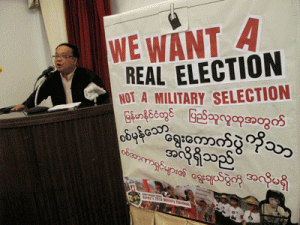Last week, Burma’s Union Election Commission (UEC) declared that the General Elections would be set for 8 November of this year. Having previously boycotted the 2010 election on the grounds the election rules were unfair, the opposition National League for Democracy (NLD) has agreed to contest the military-backed Union Solidarity and Development Party (USDP), who currently holds power.
By Burma Partnership • July 15, 2015
Last week, Burma’s Union Election Commission (UEC) declared that the General Elections would be set for 8 November of this year. Having previously boycotted the 2010 election on the grounds the election rules were unfair, the opposition National League for Democracy (NLD) has agreed to contest the military-backed Union Solidarity and Development Party (USDP), who currently holds power.
Despite a promise from President Thein Sein that the elections will be “free and fair,” there is concern amongst political opposition, ethnic minorities, civil society and the international community that they will follow the undemocratic – and even backsliding – nature of politics in Burma.
Two weeks ago, Parliament failed to pass a proposed constitutional amendment that would limit the veto power of the Burma Army and that would allow NLD leader Daw Aung San Suu Kyi to run for the Presidency, indicating that the Burma Army is unwilling to loosen their control over the country’s political sphere. Last week, unelected military representatives in parliament used their powerful voting bloc to prevent the passing of another amendment that would provide greater autonomy to state legislatures to select their own Chief Ministers, as opposed to the President. Unfortunately, the Burma Army’s preservation of power in Parliament undermines any prospect for democracy, regardless of whether or not the General Elections are a success.
In addition, the administration of the election is already rampant with controversy and questionable ethics. The process of voter registration has received criticism for containing a significant amount of incomplete or inaccurate information. Election officials have not taken a proactive approach to correcting the data and have refused to provide the necessary time required to correct any mistakes. Furthermore, these election officials have been reliant upon voters to provide correct information, as opposed to directly obtaining the information themselves. Volunteers working with the NLD to verify voting information ahead of the elections have reported that deceased individuals and those who have moved out of Burma are still included in the voting lists whereas some opposition activists have been removed from the list. Finally, additional NLD volunteers have been actively prosecuted on senseless charges for attempting to rectify incorrect information.
Due to unwaveringly strict voting rules, a vast number of prospective voters in Burma will be deemed ineligible to participate in the General Elections. Considering the discriminatory practices of the Burma Government against the Rohingya minority, it is no surprise that the recent stripping of the White Card identification system means that the majority of the 700,000 individuals holding that ID will be unable to vote. Migrant workers and refugees outside Burma, who also typically lack necessary official documentation, will likely lose the chance to take part in the elections.
Burma’s multitude of ongoing, armed conflicts with ethnic minorities is also likely to cause disruptions and prevent ethnic communities from fully exercising their right to vote. For the nearly 600,000 conflict-displaced citizens in Burma, voter registration is often inaccessible and in some cases, impossible. In a report on the electoral landscape in Burma, the International Crisis Group has predicted the difficulty of administering elections in the Kokang region, other parts of northern Shan and Kachin States, and along border areas, where conflict with the Burma Army is widespread. With recent outbreaks of violence in Karen State between the Democratic Karen Benevolent Army and the Burma Army, along the completed section of the Asian Highway between Myawaddy and Kawkareik in Karen State, it is likely that additional areas will be placed off limits for election officials.
In regards to the fragile peace agreements in place in Karen State, the Karen Peace Support Network has stated, “Ceasefire agreements fail to bring meaningful peace, instead facilitating land grabs for destructive projects under centralized control and increased militarization [by the Burma Army]. This in turn reignites conflict.” Thus the potential for conflict to emerge in other ethnic regions of the country, as it has seen already this year, could further jeopardize prospects for an inclusive election.
Furthermore, ethnic parties have expressed concern that the UEC, which lacked transparency and accountability in its role surrounding the 2010 elections, will abuse the right to issue voting cancellations in regions where military-backed candidates from the USDP and its proxy parties are unlikely to win by falsely citing security concerns.
Without the right to vote, the sheer number of disenfranchised voters could result in an unrepresentative Parliament. According to Charles Santiago, Chairperson of the ASEAN Parliamentarians for Human Rights, “All counted, we could see up to 10 million people—around 20 percent of Myanmar’s total population—unable to take part in these elections, and that could cast serious doubts over the legitimacy of the vote.”
Despite the looming shadow of the Burma Army during the reform process, the upcoming General Elections provide the opportunity for the Burma Government to demonstrate its commitment to genuine reform. To ensure that the electoral process proceeds as free and as fair as possible, it is important that the UEC and the Burma Government take all possible actions to eradicate obstacles facing voters throughout the country. This includes ensuring that voter information is correct, that disenfranchised voters are included in the process, and disruptions due to conflict are kept to an absolute minimum. Corrupt and deeply fraudulent, the 2010 elections must serve as a reminder of what can occur in the upcoming General Elections if these obstacles are not resolved. To be clear, democratic reform under the oppressive eyes of the military regime is not reform at all.
Source : www.burmapartnership.com


